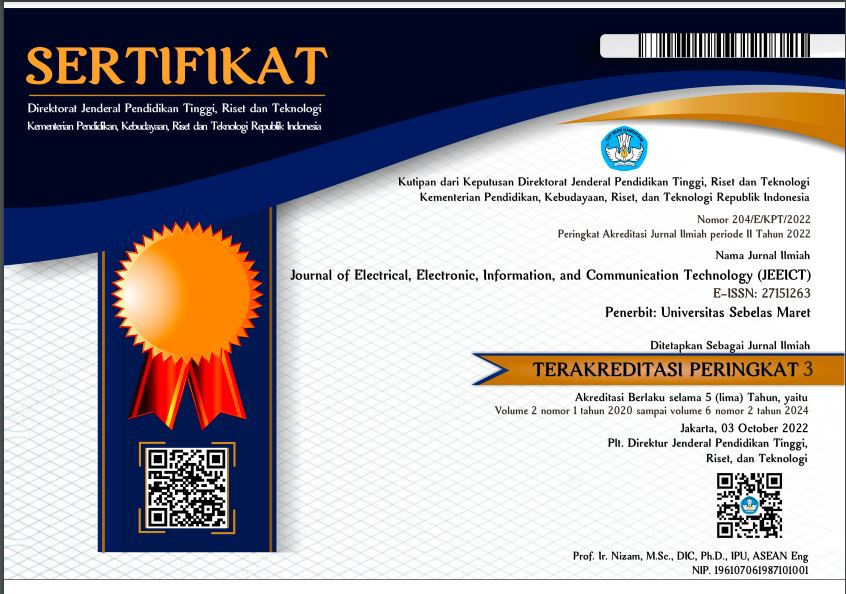Adaptive System for Streetlights in the Shopping Center Area of Purwakarta Region using Fuzzy Logic Method
Abstract
Streetlight systems generally use time condition as the parameter, which set the lights to be always on during specified period. This way, the system has flaws in its inefficiency and ineffectiveness. The system designed in this research considers the intensity of surrounding lights and passing pedestrians as the parameters, and fuzzy logic to get fuzzier output of the luminosity level for the streetlight. From the results of testing and analysis, it can be concluded that the design in this research has been successfully built as the results obtained are in accordance with the previously set fuzzy logic universe of discourse. By implementing an adaptive street lighting system in this study can help streamline light energy, because the street lighting lights can adjust themselves depending on the presence or absence of pedestrians passing by using a PIR sensor and the level of light brightness in that place using an LDR sensor.
Full Text:
PDFReferences
F. Marino, F. Leccese, and S. Pizzuti, “Adaptive Street Lighting Predictive Control,” Energy Procedia, vol. 111, pp. 790–799, Mar. 2017, doi: 10.1016/j.egypro.2017.03.241.
G. Gagliardi et al., “Advanced Adaptive Street Lighting Systems for Smart Cities,” Smart Cities, vol. 3, no. 4, pp. 1495–1512, Dec. 2020, doi: 10.3390/smartcities3040071.
A. A. Hafiz, “Implementasi Metode Fuzzy Logic Pada Intensitas Lampu di Laboratorium Berbasis Arduino,” J. SAINTIKOM J. Sains Manaj. Inform. Dan Komput., vol. 19, no. 2, p. 36, Jul. 2020, doi: 10.53513/jis.v19i2.2422.
C. T. S. Manik, “Quality Analysis of Street Lighting Protocol of Pematang Siantar City,” J. Sci. Technol. JoSTec, vol. 1, no. 1, pp. 21–28, Dec. 2019, doi: 10.55299/jostec.v1i1.48.
Hamdard University, Karachi and S. Nasim, “CONSUMER BEHAVIOR TOWARDS SHOPPING MALLS: A SYSTEMATIC NARRATIVE REVIEW,” IBT J. Bus. Stud., vol. 14, no. 1, pp. 81–94, 2018, doi: 10.46745/ilma.jbs.2018.14.01.07.
G. Turesna, Z. Zulkarnain, and H. Hermawan, “Pengendali Intensitas Lampu Ruangan Berbasis Arduino UNO Menggunakan Metode Fuzzy Logic,” J. Otomasi Kontrol Dan Instrumentasi, vol. 7, no. 2, p. 73, Jan. 2017, doi: 10.5614/joki.2015.7.2.2.
K. Arun Bhukya, S. Ramasubbareddy, K. Govinda, and T. Aditya Sai Srinivas, “Adaptive Mechanism for Smart Street Lighting System,” in Smart Intelligent Computing and Applications, vol. 160, S. C. Satapathy, V. Bhateja, J. R. Mohanty, and S. K. Udgata, Eds., in Smart Innovation, Systems and Technologies, vol. 160. , Singapore: Springer Singapore, 2020, pp. 69–76. doi: 10.1007/978-981-32-9690-9_8.
A. Avotins, L. R. Adrian, R. Porins, P. Apse-Apsitis, and L. Ribickis, “Smart City Street Lighting System Quality and Control Issues To Increase Energy Efficiency and Safety,” Balt. J. Road Bridge Eng., vol. 16, no. 4, pp. 28–57, Dec. 2021, doi: 10.7250/bjrbe.2021-16.538.
G. Oltean and L.-N. Ivanciu, “Implementation of a fuzzy logic-based embedded system for temperature control,” in 2017 40th International Spring Seminar on Electronics Technology (ISSE), Sofia, Bulgaria: IEEE, May 2017, pp. 1–6. doi: 10.1109/ISSE.2017.8001006.
M. Rahman, A. Shahriar, and E. Islam, “Power Saver: Intelligent Streetlight Systems Using Fuzzy Logic”.
S. Kambalimath and P. C. Deka, “A basic review of fuzzy logic applications in hydrology and water resources,” Appl. Water Sci., vol. 10, no. 8, p. 191, Aug. 2020, doi: 10.1007/s13201-020-01276-2.
E. B. Kristanto and S. Andrayana, “Application of Waterfall SDLC Method in Designing Student’s Web Blog Information System at the National University,” vol. 4, no. 36, 2020.
“Fuzzy Logic Toolbox User’s Guide”.
C. Henard, M. Papadakis, M. Harman, Y. Jia, and Y. Le Traon, “Comparing white-box and black-box test prioritization,” in Proceedings of the 38th International Conference on Software Engineering, Austin Texas: ACM, May 2016, pp. 523–534. doi: 10.1145/2884781.2884791.
Refbacks
- There are currently no refbacks.







